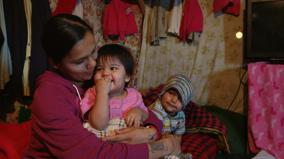New release
Coming
None
Campaign: The Making of a Candidate
2004
57 min
Leaving soon
This feature documentary follows Toronto mayoral candidate David Miller as he runs in the 2003 municipal election. Polls show Miller at only four per cent 10 months before election day, but his commitment doesn’t falter, even in the face of public attacks from outgoing mayor and political rival Mel Lastman. Campaign: The Making of a Candidate is an underdog story about a man whose commitment to improving Toronto for everyone is infectious and inspiring.

Details
This feature documentary follows Toronto mayoral candidate David Miller as he runs in the 2003 municipal election. Polls show Miller at only four per cent 10 months before election day, but his commitment doesn’t falter, even in the face of public attacks from outgoing mayor and political rival Mel Lastman. Campaign: The Making of a Candidate is an underdog story about a man whose commitment to improving Toronto for everyone is infectious and inspiring.
-
writerAndrew Munger
-
producerAndrew MungerGerry Flahive
-
directorAndrew Munger
-
executive producerAndrew MungerSilva Basmajian
-
cinematographyAndrew MungerGregory Bennett
-
editorTim Kirkwood
-
sound editingSteven GormanTom McMurtry
-
sound mixKevin Tilcar
-
composerDavid Wall
-
guitarChristopher Miller
-
visual effectsGregory Bennett
-
titlesGregory Bennett
-
colour correctionGregory Bennett
-
narratorAndrew Munger
-
wescam operatorChris Chanda
-
helicopter pilotDavid Tommassinni
-
on-lineFlashcut Editing
-
legalJohn Duncan











